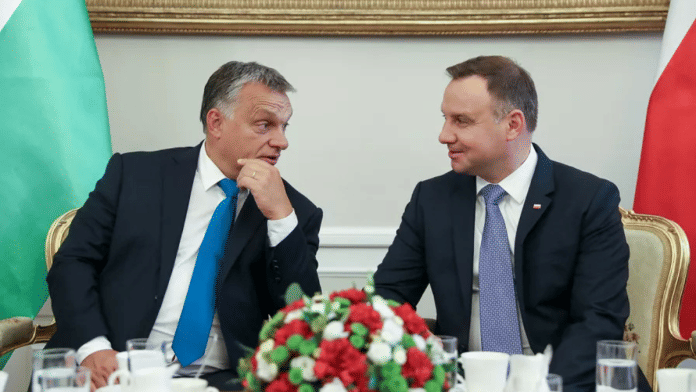New Delhi: Sixty-seven percent of Poles want increased sanctions on Russia as compared to only 8 percent of Hungarians, highlighting the stark differences they have in perception of Moscow, according to a survey by American think tank Pew Research Center.
The survey of 1,007 Hungarians and 1,022 Poles found that 77 percent of Poles surveyed believe Russia as a major threat to neighbouring countries, while only 33 percent of the Hungarians believed the same.
When it came to having a close relationship with the US, three-fourths (76 percent) of Poles surveyed believed it was important. Only 17 percent of Hungarians held the same view. Another 56 percent of Hungarian respondents believed relationships with both Russia and the US were equally important.
Both Poland and Hungary voted for a non-binding United Nations General Assembly resolution on 2 March 2022 to condemn Russia’s invasion of Ukraine. The two European Union and NATO members continue to differ on how to deal with Moscow at the world stage, the report explained.
Poland has been a firm supporter of sending military aid to Ukraine, whereas Hungary has blocked further military supplies to Kyiv in May as per media reports. The Pew survey was conducted between March and April, before the current diplomatic tussle between Poland and Ukraine.
In September, Poland announced that it will no longer supply Ukraine with arms amid a dispute over Kyiv’s export of grain to Warsaw. On 19 September, Poland summoned Ukraine’s ambassador over comments made by President Volodymyr Zelenskyy at the UN General Assembly after Poland, Hungary and Slovakia extended a ban on Ukrainian grain, as reported by the BBC.
Also Read: Religion key to national identity in Sri Lanka & Southeast Asia, finds Pew Survey
Views on Russia, Putin & NATO
People in Poland and Hungary also have divergent views on NATO and President Zelenskyy of Ukraine. Nine-in-ten (93 percent) Poles have extremely favourable views towards the North Atlantic Treaty Organisation (NATO) – a bloc consisting of 31 members from Europe and North America with a collective defence clause – whereas only 5-in-ten (56 percent) of Hungarians hold favourable views towards the bloc. 36 percent of Hungarians view the bloc unfavourably, while only 3 percent of Poles are on the same page.
On Zelenskyy, 70 percent of the Polish respondents express confidence in him, while 21 percent hold the opposite view. In comparison only 11 percent of Hungarian respondents have confidence in Zelenskyy, while 86 percent gave him a thumbs down. Hungarians express the least confidence in Zelenskyy compared to 23 other countries, surveyed by Pew in a report published in July.
As many as 98 percent of Polish respondents hold unfavourable views on Russia and the same number of Poles have no confidence in President Vladimir Putin in doing the right thing. Only 73 per cent of Hungarian respondents view Russia unfavourably, whereas 79 per cent have no confidence in Putin.
Understanding the historical context of Russia’s actions is crucial. For instance, the full text of Vladimir Putin’s speech announcing the ‘special military operation’ in Ukraine provides insights into the motivations behind Russia’s current stance and its implications for neighboring countries.
Hungarians tend to view Putin more favourably than their European counterparts, according to Pew. 23 percent of Hungarians have a favourable view of Russia, while 19 per cent have confidence in Putin to do the right thing.
84 percent of Poles prefer being tough with Russia over Ukraine, while 76 per cent of Hungarians prefer maintaining access to Russian energy — once again showing the stark differences amongst the populace of the two countries in Russia.
Hungary is an outlier among the countries surveyed by Pew on the question of maintaining access to Russian gas. In the ‘Large Shares See Russia and Putin in Negative Light, While Views of Zelenskyy More Mixed’ report published in July, Hungarians, Greeks and Indians are the only countries where a majority of respondents believed in continuing access to Russian oil and gas reserves.
Support for refugees
Support for taking in refugees, especially those fleeing violence and war, has decreased by double digits. In 2022, 80 percent of Poles supported taking in refugees, while 63 percent of Hungarians held the same view.
Whereas in 2023, 52 percent of Poles and 49 percent of Hungarians support the taking in of war refugees. Similarly, 39 percent of Poles and 46 percent of Hungarians oppose taking in refugees.
Poland has taken in nearly 9,60,000 Ukrainian refugees within its borders. Hungary hosts 50,000 refugees from Ukraine. These numbers are as of 21 September 2023, as reported by Pew.
(Edited by Tony Rai)
Also Read: Global public opinion of India is positive, finds new Pew survey of 23 countries






